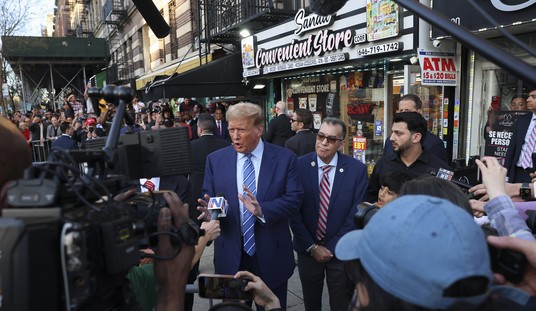On Thursday, the Advancement Project, an organization funded by the convicted felon George Soros, will sue Wisconsin over the new state Voter ID law. Mr. Soros might question why the Advancement Project is using his money to attack a law that got its first trial yesterday, and everything seemed to go smoothly. There were not mobs of voters turned away at the polls. Nor were there multitudes of disenfranchised racial minorities.
The Advancement Project press release about the lawsuit to be filed tomorrow was posted at various sympathetic blogs, and then it mysteriously vanished. I called the Advancement Project and asked why.
Erika Maye in the press office told me the press release was pulled, not because everything went well in yesterday’s Wisconsin debut of Voter ID, but rather because “the lawyers didn’t want the announcement out before the lawsuit was filed.” Here’s the vanished presser from the Advancement Project:
WISCONSIN SUED OVER RACIALLY DISCRIMINATORY VOTER LAW
FIRST SUIT TO SPECIFICALLY CHARGE RACIAL DISCRIMINATION
78 PERCENT OF YOUNG BLACK MEN COULD BE BARRED FROM THE POLLS
Milwaukee, WI – Advancement Project, joined by the League of Young Voters and the Milwaukee Area Labor Council, will file the first lawsuit based on a claim of racial discrimination against Wisconsin Governor Scott Walker and members of the Government Accountability Board charging that a newly enacted restrictive voter identification law specifically discriminates against African American and Latino voters.
The lawsuit, to be filed Thursday February 23, challenges Wisconsin Act 23 under Section 2 of the Voting Rights Act, which prohibits the institution of any electoral procedures that deny or abridge the rights of citizens to vote on account of race or color.
“This law is a part of the largest legislative effort to turn back the clock on voting rights in our nation in over a century and shows how essential the Voting Rights Act is to allow all Americans their right to vote,” states Advancement Project co director Judith Browne Dianis, one of the nation’s leading civil rights litigators. “If this bill is allowed to stand it will undermine the basic fabric of our nation’s democracy.”
Studies in Wisconsin have confirmed that racial minorities, especially African American and Latino voters, are far less likely to have a Wisconsin-issued ID, finding that roughly half of the state’s African Americans and Latinos lack a valid driver’s license. Specifically, a 2005 study determined that 55% of Black males and 46% of Hispanic males – as compared with only 16% of white males – lack a driver’s license. Among females, 49% of African Americans and 59% of Latinas lacked a driver’s license as compared to 17% of Whites.
When age and race are considered together, the disparities become far more pronounced: an astounding 78% of African-American males (as compared with 36% of White males) aged 18-24 lack a driver’s license, and 66% of African-American females (as compared with 25% of White females) aged 18-24 lack a driver’s license. The study also found a disparate impact on Latino voters: 57% of young Latino males age 18-24 lack a driver’s license, as compared to 36% of White males age 18-24.
One of the lead plaintiffs is Bettye Jones, 77, who was born at home in Tennessee and had no birth certificate filed of her birth. She has voted in every election since 1956 and advocated as a civil rights activist for the Voting Rights Act. Despite being a registered voter, and having a valid and current ID from another state, she will not be allowed to vote. She has tried in vain to get a voter ID and will be disenfranchised in April’s primary elections as a result.
Wisconsin’s law, the strictest voter identification law in the nation, requires citizens to present limited forms of current, government-issued photo identification before receiving a ballot. Commonly held forms of identification like state or federal employee IDs, veterans’ cards, most college and university identification cards, and out-of-state or expired driver’s licenses are not allowed.









Join the conversation as a VIP Member